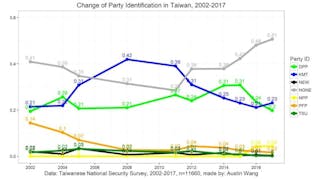What you need to know
Data suggests Taiwan voters increasingly identify as non-partisan.
By Austin Horng-En Wang and Yeh-Lih Wang
In the past two years, one of the most important phenomenon in Taiwan politics is the emergence of non-partisans. For the first time since democratization, more than half of Taiwanese voters do not support any party in Taiwan.
This dramatic change may attribute to the electoral reform in 2005 as well as President Tsai Ing-wen (蔡英文)’s performance. The shift will undoubtedly impact on the major parties’ intraparty politics and strategic choices. However, what these non-partisans want and where they are from remains unclear.
To begin with, the figure below shows the percentage of partisans and non-partisans in the past 10 waves of the Taiwan National Security Survey (TNSS) from 2002 to 2017. TNSS is a representative telephone survey sponsored by Duke University and conducted by National Chengchi University. After Tsai won the presidency in early 2016, the proportion of non-partisans in Taiwan reached an historic high of 48 percent. In late 2017, the record was broken again, breaking 51 percent, representing a doubling of the proportion of non-partisans in Taiwan since 2011. Today, more than half of Taiwanese people do not attach to any party in Taiwan, according to the survey.

Who are these non-partisans? Analysis of TNSS 2017 fails to reveal any unique characteristics among them. Applying the chi-squared test shows that non-partisans share the same socio-demographic background as partisans across age, gender, race, level of education, language usage, and residency. Besides, Taipei City does not have a higher proportion of non-partisans than other municipal areas or counties. The decline of partisanship has become a general trend among all Taiwanese people.
This trend is even more intriguing when we started exploring their attitudes on cross-Strait issues, the only dominant dimension in Taiwan politics. In fact, over 75 percent of these non-partisans still have a say about what they hope for in the future of the China-Taiwan relationship; some are closer to the pan-green camp while the others are not distinguishable from the pan-blue camp. However, they still decline to support any of the more than 300 registered parties in Taiwan.
Three reasons may help explain the decline of partisanship. Firstly, Democratic Progressive Party (DPP) supporters may be disappointed with some of Tsai’s policy failures including the flip-flop labor law reform, an unstable electricity supply, and worsening air pollution.
Besides, hardcore DPP supporters are unsatisfied with Tsai’s moderate position on cross-Strait relations, with the New Power Party serving as a clearly distinguished point of comparison.
In TNSS 2017, Tsai only received a 60 percent approval rate among DPP supporters, and 18 percent among non-partisans (54 percent of non-partisans disapprove of Tsai). Since it is the first time that the DPP controls both the executive and legislative branch, they can hardly avoid taking responsibility for policy failures.
Secondly, the Kuomintang has failed to attract more support from among this base of disappointed DPP voters because of its composition and unwelcome/unclear cross-Strait policies.
In TNSS 2017, 11 percent and 25 percent of KMT supporters self-identified as Chinese only and Taiwanese only, respectively; but the proportions among non-partisans are 3 percent and 48 percent. This gap foreshadows declining KMT support given that national identity among the young Taiwanese is less influenced by China factors. Meanwhile, the internecine conflict between KMT chairman Wu Den-yih (吳敦義) and former chairwoman Hung Hsiu-chu (洪秀柱) blurs the party's stance on China.
Thirdly, Taiwanese people have not embraced minor parties because of their low chance of winning in general elections. After the constitutional reform in 2005, single-member-district design, a 5 percent threshold in the proportional representation seats, and the presidential system all help promote a two-party system in Taiwan – or, to some extent, a cartel party system. Even though some Taiwanese voters feel themselves ideologically closer to one of the small parties, they may choose not to waste their votes.
The emergence of non-partisans has several significant implications to politics and democracy in Taiwan. Among the politicians, the rank-and-file members in both the KMT and DPP may be motivated to adopt more extreme positions because of the disappearance of moderate partisans. At the same time, the two-party chairs will find it harder to bring the party back to a moderate position. Even though the two major parties conducted open-polls for their candidate nominations, the lack of moderates may still exacerbate intra-party factionalism.
Among voters, public opinion in Taiwan may become more unstable and contradictory. Partisanship serves as a psychological heuristic for voters to be informed and parties themselves are essential platforms for the interaction between interest groups and public opinion. Since the majority of Taiwanese are apparently now non-partisan, they are much more likely to treat distinct policy issues separately.
Most importantly, the overwhelming proportion of non-partisans could serve as a hotbed for populism.
Most importantly, the overwhelming number of non-partisans could serve as a hotbed for populism. When people do not trust any existing party on the ballot, they tend to turn to new politicians who vow to subvert the existing political system and all elites – witness the embrace by U.S. voters of Donald Trump as a case in point.
Such a platform could be amplified in the upcoming local congress elections, in which the single non-transferable vote electoral system encourages extreme strategies. To prevent such a scenario, President Tsai and major parties must firmly embrace and defend Taiwan's core democratic values including human rights, the rule of law, fair elections, and procedural justice.
Read Next: President Tsai's Transitional Justice Act Opens Old Wounds and New
The News Lens has been authorized to repost this article. The piece was first published by Taiwan Insight, the online magazine of the University of Nottingham’s Taiwan Studies Program.
Austin Horng-En Wang is Assistant Professor in the Department of Political Science at the University of Nevada, Las Vegas. Yeh-Lih Wang is Professor in the Department of Political Science at the National Taiwan University, Taipei.
TNL Editor: TNL Staff


